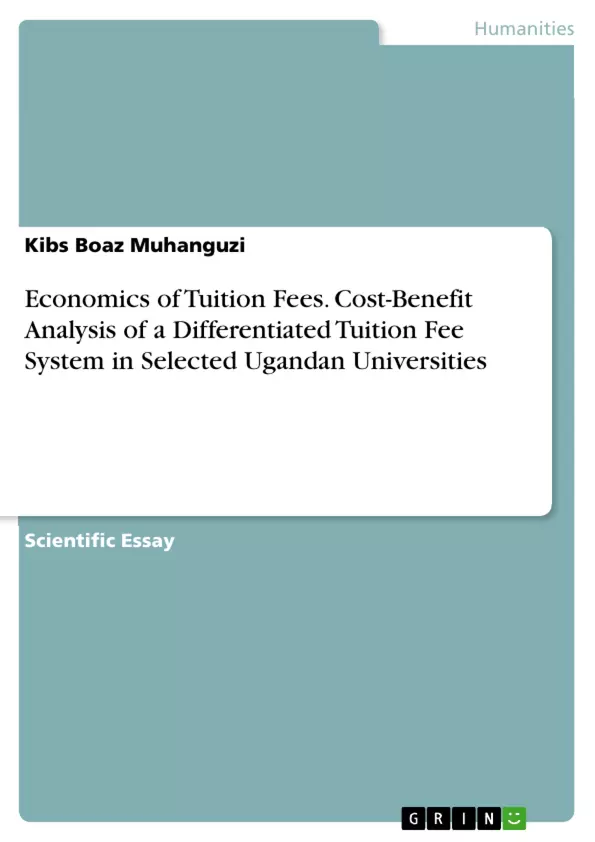Globalization and privatization drive have recently brought many investors into the education sector in Africa. Increased competition in provision of university education has led various institutions to adopt various strategies to maximize benefits from their investments. The key strategic policy adopted has been a tuition fee discrimination system thought to capture more clients. The extent at which this practice has been beneficial to firms and students is what this paper investigates.
This is done by analyzing costs and benefits of the system. Using the contingent valuation method as a Benefit-Cost analysis tool, and the monopolistic price discrimination theory (third degree), this paper assesses the costs and benefits derived from a differentiated tuition fee system in Ugandan Universities. To achieve this, a descriptive correlation approach and a cross-sectional sampling design are adopted. Purposive and stratified sampling techniques are used in sample selection.
Using self administered questionnaires and interviews, data is collected from respondents in three different colleges/schools from four Universities in Uganda. Using Pearson’s correlation coefficient to analyze the relation between costs and benefits and tuition fee differentiation system, the study finds tuition fee differentiation system to have a significant correlation with benefits accrued and an insignificant correlation with costs involved.
This Implies that investors in Ugandan universities are still benefiting from monopolistic behaviors like tuition fee differentiation. This result stands as a warning to potential students for the need to first scrutinize programs they are to join basing on their capabilities and potentials. However the result displays a green flag for potential investors in university education. The benefits from investment are still higher.
Inhaltsverzeichnis (Table of Contents)
- Introduction
- Review of Related Literature
- Third Degree Price Discrimination Theory and Economics of Tuition Fees
- Cost-Benefit Analysis of a Differentiated Tuition Fee System
- Methods and Techniques
- Findings and Interpretations
- Conclusion
- Recommendations
- References
Zielsetzung und Themenschwerpunkte (Objectives and Key Themes)
This paper examines the costs and benefits of a differentiated tuition fee system in selected Ugandan universities, focusing on the impact of this system on human development and the economic principles underlying it.
- The impact of a differentiated tuition fee system on human development in Uganda.
- The application of the third-degree price discrimination theory to explain tuition fee differentiation in Ugandan universities.
- The costs and benefits associated with a differentiated tuition fee system in terms of enrolment, revenue, and student access to education.
- The role of globalization, privatization, and competitive markets in influencing tuition fee practices in Ugandan universities.
- The economic rationale behind price discrimination and product packaging in the context of higher education.
Zusammenfassung der Kapitel (Chapter Summaries)
The introduction discusses the significance of education in achieving sustainable development goals and introduces the concept of a differentiated tuition fee system. It explores the rationale behind tuition fee discrimination and its implications for student enrolment and revenue generation. The paper examines the evolution of tertiary education in Uganda, including the increasing role of private universities and the impact of globalization and privatization.
The literature review delves into the third-degree price discrimination theory, which provides a theoretical framework for understanding tuition fee differentiation. The theory is applied to the context of Ugandan universities, analyzing the factors that influence the elasticity of demand for education and the strategies employed by universities to maximize profits. The section also examines cost-benefit analysis in relation to a differentiated tuition fee system, exploring the potential benefits and drawbacks of this system.
Frequently Asked Questions
What is a differentiated tuition fee system?
It is a strategy where universities charge different fees for different programs or student categories, often based on the perceived value or demand of the course, similar to price discrimination.
How does the third-degree price discrimination theory apply to universities?
Universities segment their "market" (students) into groups and charge different prices based on their willingness or ability to pay, aiming to maximize revenue and enrollment across different disciplines.
What are the benefits of this system for Ugandan universities?
The study finds that differentiated fees have a significant positive correlation with the benefits accrued by institutions, such as increased revenue and the ability to capture a wider range of clients.
Are there significant costs involved in implementing differentiated fees?
According to the research, there is an insignificant correlation with the actual costs involved, suggesting that the administrative burden of price differentiation is low compared to the financial gains.
What advice does the study give to potential students in Uganda?
Students are warned to scrutinize programs based on their own potentials and the long-term value of the degree, as universities may use monopolistic pricing behaviors that don't always align with student interests.
- Quote paper
- Kibs Boaz Muhanguzi (Author), 2013, Economics of Tuition Fees. Cost-Benefit Analysis of a Differentiated Tuition Fee System in Selected Ugandan Universities, Munich, GRIN Verlag, https://www.grin.com/document/350768



